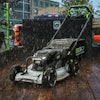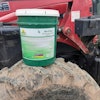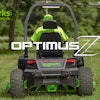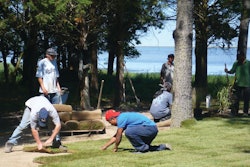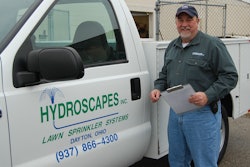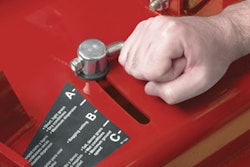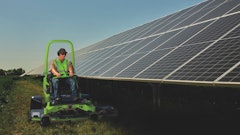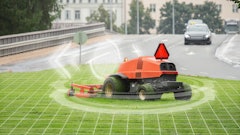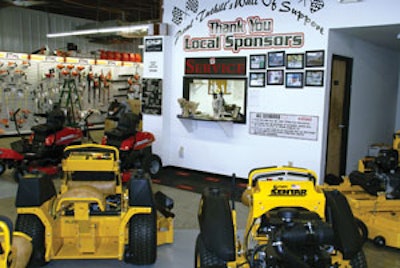
Hudson Valley Power Equipment
Monroe, NY
hvpe.com
Founded: 1983
Owner: Scott Tuthill
Employees: 3 full time,
2 part time
Annual Sales: $1 to $2 million
Sales Mix: 66% wholegoods, 19% parts, 15% service
Customer Mix: 70% commercial, 30% consumer
Shop Labor Rate: $65 per hour
Major Lines: Billy Goat,
BOB-CAT, Redmax, Ryan, Snapper, Stihl, Toro, Wright
Everything about this outdoor power equipment dealing family has been about setting goals and working nonstop to reach them. Located less than an hour from Manhattan, and surrounded by the box store competition, they built a new dealership from the ground up to attract contractors and prosumers to the commercial-grade equipment that occupies 80% of the new showroom floor. When the green flag waves, the Tuthills are ready to go.
Having been in the industry since 1983, working his way up from the bottom of the dealership chain, Scott Tuthill of Hudson Valley Power Equipment in Monroe, NY, had developed a vision for what his own dealership could be. The vision began with a newly built outdoor power equipment superstore.
A STORE THAT SCORES
The dealership Tuthill originally purchased had been on its lot for 40 years, starting as a simple shop in a garage. “It was just one guy doing part-time work out of his garage,” says Tuthill. “The man he sold to built on, and later we purchased it.” When Tuthill purchased the business, it had seen several additions built on. They continued to work with what they had and installed new lighting, displays, counters and signage.
Business was booming and soon their sales would be too much for this building to hold. “We had a lease with the option to buy after five years,” says Tuthill. “Our fourth year we were already over a million in sales.” The year the Tuthills took over the dealership, the last owner’s sales were at $560,000.
“We were bursting at the seams and there was no way we could function anymore in that building,” explains Tuthill. He was lucky enough to find a piece of property only half a mile down the same stretch of road. On that lot, Tuthill built from the ground up what he envisioned to be a dealership that could compete with the best big boxes in town. Good thing he did, because he was surrounded by them.
In 2004 they moved into their new superstore. “We copied the big box store and did something modern,” says Tuthill. “We wanted to take it to the next level. Our last location was typical of the industry, but we saw the writing on the wall and knew that if you’re not clean and orderly you won’t attract customers—and you won’t last.”
The new store featured showroom-style lighting, public restrooms (the last store only had an employee bathroom behind the shop), clean and durable concrete floors, and equally durable steel walls.
I’ve been to many places that use nice tile or carpeting, and had been framed with drywall,” says Tuthill. “Initially, when you first put it in, it looks great. But after moving equipment around for two or three seasons, there is a lot of upkeep and it starts to look ratty.” Tuthill has maintained a bright but durable look in the dealership, rivaling the big box stores.
COMMERCIAL EQUIPMENT FOCUS
Tuthill attributes the sales success that necessitated the larger dealership to their focus on commercial sales. He wanted to be the go-to guy for commercial equipment, and that is what he soon became. “The business as it existed was not really catering a lot to commercial guys even though the area had experienced huge residential growth,” says Tuthill. “The easy commute to Manhattan made us a bedroom community for New York City.” Within two years of taking over, Tuthill switched sales from 80% residential and 20% commercial to 50-50.
Now, 80% of the showroom is dedicated to displaying commercial products. “We work very hard for our landscapers and that is what it comes down to,” explains Tuthill. “Nearly every year they are buying new equipment, and regularly need repairs and parts.” The Internet has taken away some of their parts business, making it easy for the end-user to purchase parts. Landscapers, who need parts fast and frequent, continue to stop in regularly for anything from blades to trimmer line to oil.
The Tuthills have focused on providing commercial equipment options to contractors, but they won’t shut out a consumer customer, many of whom come in after visiting an area big box. As houses in the area continued to go up, big boxes did as well. “We tried to coexist with them initially, doing service work for the local Home Depot, Wal-Mart and Tractor Supply,” says Tuthill. “But we couldn’t find a way to make money doing it.”
The warranty repairs didn’t pay, and have since stopped. Consumer customers continue to come in for repairs on equipment bought elsewhere, but are quickly informed that they won’t be first on the “to do” list. “Shop wise, we work on the homeowner stuff as much as we can,”says Tuthill. “But it is explained that if a homeowner has purchased something from us, they are in the normal lineup on the service side. If they haven’t, we will service it, but let them know that my customers come first.” Tuthill says this honest explanation sometimes angers customers, but many other times it helps convert one of the big box shoppers into a dealer-loyal customer.
“I have customers that decide to purchase from us after being explained the situation,” shares Tuthill. “We are very proud of the way we take care of our customers, and it shows. I would say I get just as many sales that way as I would trying to work on everything the mass merchants send our way.”
To the Tuthills, a visit from a consumer is just another opportunity to pair someone up with a commercial unit. “Roughly 20-25% of my commercial sales are to residential customers,” says Tuthill. “In our area, customers have anywhere from two- to three-acre yards and are getting tired of the throwaway tractors that give them nothing but problems.”
Tuthill and his team, which consists of wife Gayle, daughter Susan and son Paul (see “The Lean Team” on page 12 for more), appeal to the value of time vs. money when selling commercial-grade equipment to residential users. “We explain to them that for a little bit more money, they will get a lawn that looks like a landscaper maintains it, but in very little time,” says Tuthill. “The equipment is also going to last nearly 15 years because they aren’t running the product to the max like it is designed for.”
Once one person in the neighborhood gets a mower from Hudson Valley Power, others take notice and often come in for their own piece of equipment. They may have even seen Tuthill himself on a neighbor’s lawn giving a demo. “We try to get the serious customers to know what the product’s about and think about what it can do for them,” says Tuthill. “We often do that with onsite demos of three or four units similar in size to what they need or want.”
IN THE SHOP AND BEHIND THE WHEEL
Tuthill’s bright, welcoming dealership and strong commercial sales tactics do a lot to bring the customers through the doors. On top of that, his son Paul is not only a top-notch mechanic, but also a bit of a celebrity. When he’s not turning wrenches in the shop, he’s taking laps around the racetrack in his Ford Thunderbird (paultuthillracing.com).
Paul, like his father, has been a fan of racing since a very young age. “I grew up at the racetracks,” says Tuthill. “My son started the same way, going to his first race when he was four.” Paul started racing at the age of 13 and is now 18 years old.
His racing has been a passion of the family and has turned into a marketing opportunity for the business as well. “If Paul hadn’t gotten involved in racing, I would have probably put the business’s name on another car because many people from the area attend races,” explains Tuthill. “It’s a good marketing tool. The people that see races remember the names on the side of the car.”
Along with the dealership’s name, race goers will also see several sponsor logos. Sponsors include manufacturers, landscape contractors and other area businesses. “We use it as a tool for helping Paul, while the sponsors reciprocate very well by sending customers my way,” explains Tuthill.
This year Tuthill is working closely with Schiller Grounds Care distributor Steven Willand Inc. on marketing plans for 2009. “They are going to be the primary sponsor on the car for this year,” says Tuthill. “Plans are even underway to have Paul and his car in the BOB-CAT outdoor display at the Green Industry Expo this year.”
Tuthill also hopes to help out other BOB-CAT dealers in cities hosting races, working with BOB-CAT on advertising and the possibility of dealer booths at the tracks. “We’d like to run an ad and get together with a strong dealer in that area,” says Tuthill. “They might even be treated to a night in the pits with a radio headset during the race.” Tuthill also advertises in the local paper and through their impressive website (hvpe.com).
When the weekend races are all finished, it’s back to work on Monday for the Tuthills. “We sometimes can’t get Paul to do much service the morning after a race,” explains Tuthill. “People come in just to talk to him about the race but usually end up buying something.” Paul is the lead mechanic, focusing on commercial customer equipment. He has built many relationships with customers as a tech and through his racing.
Though he is a great technician, Paul hopes to pursue racing as long as he can. Tuthill hopes to help him reach his goal of one day taking over for Dale Earnhardt Jr. “His number one focus right now is racing, and he has put in a lot of time and training,” shares Tuthill. “There are a lot of talented kids out there and few make it. Paul understands that.” Paul is working hard to increase his chances of making it, training in public speaking, interview skills, and working closely with NASCAR race academies on appearances and networking.
If the racing thing doesn’t pan out, Paul and his father have another goal lined up. The two would like to start a mobile equipment repair business. “With the mobile repair unit, we can go out to the jobsite or equipment storage locations to do repairs,” says Tuthill. “As dealerships that are forced to compete with big box pricing become fewer and fewer, we really want to focus on the commercial customer to stay competitive.” The Tuthills hope the mobile repair unit will meet commercial cutter needs, and can one day become a franchise.
As the Tuthills continue to set goals and lap the box store competition on the way to the finish line, they keep their future as a dealer top of mind. Being an outdoor power equipment dealer is a challenge, but one they are happy to meet. “It’s a tough business,” says Tuthill. “But if you’re smart you can make money—and it has treated us well.”
The Lean team
At one point, the Hudson Valley Power Equipment team consisted of eight employees. In an effort to be like a mass merchant, Scott Tuthill thought he needed a larger staff to meet customer needs. At their peak, they had three full-time mechanics, an outdoor salesperson, two parts people, as well as Tuthill and his wife Gayle.
Since, they have trimmed down their staff. “Being so heavily staffed wasn’t putting a whole lot in our pocket,” explains Tuthill. “Between payroll and insurance, it wasn’t profitable. It seems the more people you have the more headaches you have.” Their staff now consists of three full-time and two part-time employees. Only one isn’t a family member.
Wife Gayle does most of the parts and equipment orders, 95% of sales, and with an accounting degree, handles all of the company’s finances. Daughter Susan has recently come back to work at the family business and is focusing on parts sales and equipment warranties. When he’s not busy talking with interested customers about the most recent race, son Paul works on the commercial cutter repairs. Tuthill himself manages the store overall and does consumer repairs in the shop.
“Since we’ve concentrated our staff, we’ve noticed that four people who really know what they are doing can do the work of six,” says Tuthill. “There are a few times a year when we struggle. It’s not easy and we work hard, but by getting through it, payroll and staff for the rest of the year is much more manageable.”
All of the workers are knowledgeable enough to fill in where necessary, and willing to do the work to get ahead. “We are the ones taking all the risk and working hard,” says Tuthill. “It’s not getting any easier to make money in this business, and there is a lot of work and aggravation. But if you can make a go at it, it’s the only way to go.”
